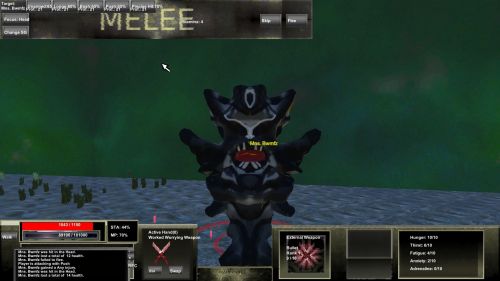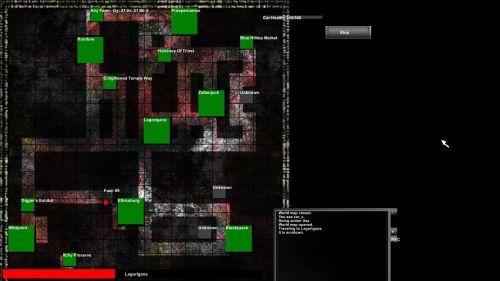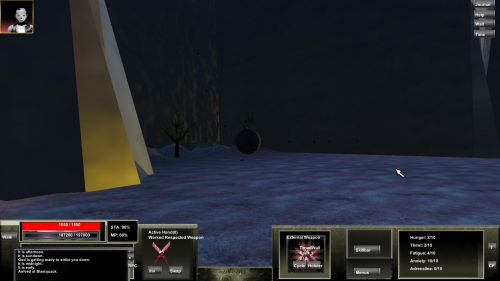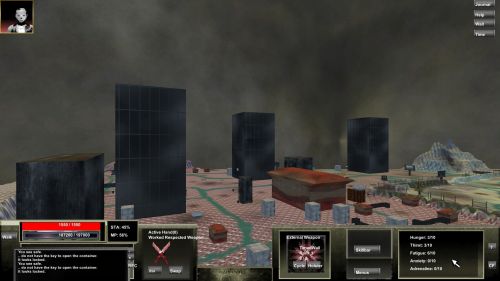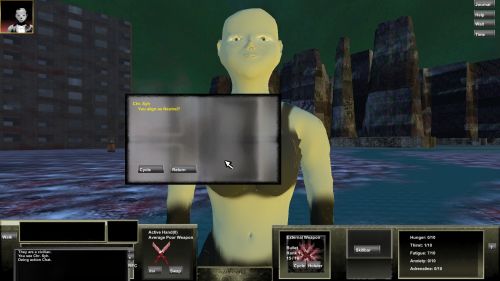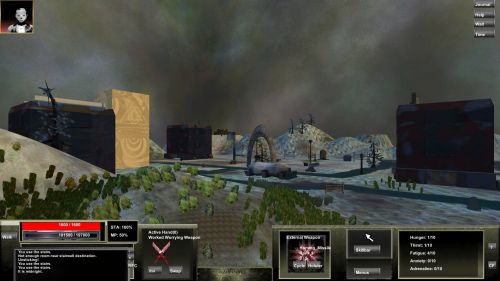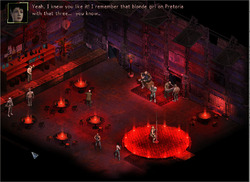Redaxium - a feature-rich RPG unlike anything else, made by a truly visionary artist
Redaxium - a feature-rich RPG unlike anything else, made by a truly visionary artist
Codex Review - posted by DarkUnderlord on Mon 24 January 2022, 00:42:00
Tags: prosper; Redaxium[Review by Moonrise]
Redaxium is an attempt by a lone developer to create an open world RPG in the vein of Bethesda's Fallout games. A mad but valiant endeavor. It began development being closer to classic Fallout, then shifting to a more modern experience, resulting in a pleasant combination of elements from both. Being wholly the product of one man is both the game's saving grace and the biggest problem with it. For many players the main draw in this niche is the exploration. Thought was clearly put into environmental storytelling, but a lack of assets lessens the impact. This isn't a surprise, given that the typical team at Bethesda in their heyday was roughly one hundred, versus one. The developer, who goes by the name Prosper, in addition to working alone refused to use any assets created by other people. So it truly is his vision. Narratively, he describes the game as "a post-industrial world with infighting and conspiracy surrounding the group rights of man and machine." That isn't reflected in the game as much as he had hoped, but there are traces of the idea, and it does serve as fertile ground for the imagination. The NPCs you meet don't have a lot of characterization, since their dialogue is brief to the extreme. But you will meet some interesting characters—a man named Riglor for example, who accepts body parts in exchange for candy. What does he do with them? Maybe it's better we don't know. The unintentional silliness makes the game feel more Six-String Samurai than other more serious post-apocalyptic inspirations. Despite being undercooked there is fun to be had, as the gameplay mechanics do come together.
You probably wouldn't have guessed, but somehow Redaxium is astoundingly feature-rich. The developer really showed his persistence here, or maybe his stubbornness. He said admittedly, "I can't even remember all the features of my own game." Are all these features fleshed out? Well, no. But everything works well enough. There are options for adjusting the difficulty: a beginner mode that provides a head start; respawning, which will allow you to revive at the cost of all your items; a hardcore mode for the masochistic. Character customization is rich. You'll find all the usual RPG services—shops, inns, clinics, etc. A few systems will likely go unnoticed, reputation for instance, but you won't be bothered by them either. Combat is turn-based. However, there are environmental hazards. Some are easy to avoid, while others might catch you off-guard. Automated turrets will fire on you whether you're in friendly or hostile areas, showing just the kind of twisted world you're living in. You'll want to watch out for killer drones that are straight out of Screamers. Map travel is similar to Fallout 1 and 2, and is actually quite good. Traveling this way will run the clock down faster, and does trigger random encounters. Sometimes you'll get lucky and find an inn or a trader instead of a group of enemies.
Other notable features include:
If you'll excuse the brief interruption, I'd like to address the elephant in the room. Regardless of how the developer perceives himself, people will undoubtedly and at first glance recognize Redaxium as the work of an outsider artist. For those unfamiliar with the term, it describes artists who for one reason or another exist outside of the mainstream. They're typically self-taught. Popular examples include musician Daniel Johnston, and programmer Terry Davis. Sure, there are games that appear superficially similar, but a cursory investigation will reveal that they're tongue-in-cheek meme games. Redaxium is not one of them. Too often in these cases people are interested in the artist rather than the art, especially here on the RPG Codex where Prosper is something of a local legend. But this is a review is about a game, not the man who made it. In his own words, "We only have a story to tell because there is a game." I tasked myself to engage with, complete, and review Redaxium with a sense of seriousness. That means respecting that some things ought to remain redacted.
Prosper was forthcoming about the difficulties he's endured as an indie developer, and with this project. He told me that not wanting to settle for an okay game led to feature creep. You can imagine the kind of problems that caused. In early access, prior to my playing the game, he admitted, "Basically everything had gone wrong at some point." Kudos to him for pulling through. Lagorigana, the central hub, was meant to be more citylike. It would've had a greater sense of verticality. But as with many aspects of the game, concessions had to be made. The story isn't as developed as was intended. As mentioned, the plot point of the rights of man and machine is evident, but not something the player really experiences. One of the playable characters, as a cyborg, was meant to help drive that conflict. He explained, "Scroozeleah was my first believable character. A strong woman, independent, and... she's at the center of the drama between the three races. She puts pressure on the Hybrid issue, because she's such a staunch supporter." You can read a little bit about that in the game. Whether any of this will be expanded upon in future updates, we'll have to wait and see.
The visuals are polarizing. I'll be told that was an understatement. It's turned people away—intrigued others. Overall Redaxium looks like a Nintendo 64 game you've never heard of. It was aesthetically influenced by an obscure Doom 3 mod called Duck Nukem. If you look up a playthrough, you'll see the similarities. Unfortunately, Prosper was unable to emulate the look to his satisfaction due to difficulties with the Unity engine, saying, "I think the shadows/darkness would have really helped to conceal [the] emptiness." While the lack of assets is a negative, sparseness kind of works for the game. It's appropriate for the genre. You do feel like you're in a desolate place. Object models appear to be cargo cult reproductions of their real life equivalents. If we're being generous, given that the story features an oppressive caste of robots, perhaps the form has remained but the function has been forgotten. Character models are something else entirely, something Prosper is known for. It's as if Louis Wain in his latter days time traveled and took a 3D modeling course at community college. I say that affectionately. For some, the character models may be the entire rationale for buying the game, because they're so uniquely his. There just isn't anything else like it. You may find Redaxium to work for you entirely as an art game. If ever there's a niche for it to fill, that's the one.
I was told that after a failed collaboration Prosper decided to teach himself audio production. Maybe that was for the best, because it's all surprisingly competent. Sound effects do the job. The tracks are ambient and industrial, perfectly suiting the atmosphere of the game. The lack of musicality means you can simultaneously enjoy your own music while playing. If you prefer, the option is available to turn everything off. There isn't much to say, because it just works.
Controls are a keyboard and mouse affair. Lots of menus and buttons. CRPG players will feel at home. The UI is a mess visually, but it's functional. Frankly, I'm not a fan of modern minimalistic UIs. They're horribly lacking in character. So give me the mess. I'll take the mess! Regarding the feel, one Steam reviewer remarked that the game "plays with about the same ease as piloting a nuclear submarine by yourself." That's hyperbole. It's not that bad. Redaxium is a very DIY experience. The game doesn't hold your hand for more than a few minutes before leaving you to your devices. If you're the type of player who enjoys blazing their own trail, you'll find that refreshing. Given that it's an open world RPG made by one guy, there were far fewer bugs than expected. I was able to complete the game with minimal fuss. As of the most recent patch, 1.03c, everything seems reasonably stable.
Let's be real about value. The game costs less than the price of a movie ticket. Out of sheer curiosity you'll get that much out of it. If aspects of the game are enjoyable to you, you'll find much more. The main quest should take about eight hours. The developer told me that replay value was something he put a lot of thought into. Like any good RPG, there are different ways to create and build your character, and different ways to go about achieving your goals. For the intrepid explorer, you'll be happy to know there are a few secrets to discover. Redaxium is unlike anything else. I can't give a glowing recommendation, but I do suggest you check it out.
Well men, live long and prosper.
Redaxium is an attempt by a lone developer to create an open world RPG in the vein of Bethesda's Fallout games. A mad but valiant endeavor. It began development being closer to classic Fallout, then shifting to a more modern experience, resulting in a pleasant combination of elements from both. Being wholly the product of one man is both the game's saving grace and the biggest problem with it. For many players the main draw in this niche is the exploration. Thought was clearly put into environmental storytelling, but a lack of assets lessens the impact. This isn't a surprise, given that the typical team at Bethesda in their heyday was roughly one hundred, versus one. The developer, who goes by the name Prosper, in addition to working alone refused to use any assets created by other people. So it truly is his vision. Narratively, he describes the game as "a post-industrial world with infighting and conspiracy surrounding the group rights of man and machine." That isn't reflected in the game as much as he had hoped, but there are traces of the idea, and it does serve as fertile ground for the imagination. The NPCs you meet don't have a lot of characterization, since their dialogue is brief to the extreme. But you will meet some interesting characters—a man named Riglor for example, who accepts body parts in exchange for candy. What does he do with them? Maybe it's better we don't know. The unintentional silliness makes the game feel more Six-String Samurai than other more serious post-apocalyptic inspirations. Despite being undercooked there is fun to be had, as the gameplay mechanics do come together.
You probably wouldn't have guessed, but somehow Redaxium is astoundingly feature-rich. The developer really showed his persistence here, or maybe his stubbornness. He said admittedly, "I can't even remember all the features of my own game." Are all these features fleshed out? Well, no. But everything works well enough. There are options for adjusting the difficulty: a beginner mode that provides a head start; respawning, which will allow you to revive at the cost of all your items; a hardcore mode for the masochistic. Character customization is rich. You'll find all the usual RPG services—shops, inns, clinics, etc. A few systems will likely go unnoticed, reputation for instance, but you won't be bothered by them either. Combat is turn-based. However, there are environmental hazards. Some are easy to avoid, while others might catch you off-guard. Automated turrets will fire on you whether you're in friendly or hostile areas, showing just the kind of twisted world you're living in. You'll want to watch out for killer drones that are straight out of Screamers. Map travel is similar to Fallout 1 and 2, and is actually quite good. Traveling this way will run the clock down faster, and does trigger random encounters. Sometimes you'll get lucky and find an inn or a trader instead of a group of enemies.
Other notable features include:
- Body part targeting and attack variety
- Skills for both combat and roleplay
- Hireable mercenaries
- Survival elements—needs, injuries, etc.
- A day/night cycle with both visual and mechanical effects
- Purchasable cars that speed up map travel
- Camping
If you'll excuse the brief interruption, I'd like to address the elephant in the room. Regardless of how the developer perceives himself, people will undoubtedly and at first glance recognize Redaxium as the work of an outsider artist. For those unfamiliar with the term, it describes artists who for one reason or another exist outside of the mainstream. They're typically self-taught. Popular examples include musician Daniel Johnston, and programmer Terry Davis. Sure, there are games that appear superficially similar, but a cursory investigation will reveal that they're tongue-in-cheek meme games. Redaxium is not one of them. Too often in these cases people are interested in the artist rather than the art, especially here on the RPG Codex where Prosper is something of a local legend. But this is a review is about a game, not the man who made it. In his own words, "We only have a story to tell because there is a game." I tasked myself to engage with, complete, and review Redaxium with a sense of seriousness. That means respecting that some things ought to remain redacted.
Prosper was forthcoming about the difficulties he's endured as an indie developer, and with this project. He told me that not wanting to settle for an okay game led to feature creep. You can imagine the kind of problems that caused. In early access, prior to my playing the game, he admitted, "Basically everything had gone wrong at some point." Kudos to him for pulling through. Lagorigana, the central hub, was meant to be more citylike. It would've had a greater sense of verticality. But as with many aspects of the game, concessions had to be made. The story isn't as developed as was intended. As mentioned, the plot point of the rights of man and machine is evident, but not something the player really experiences. One of the playable characters, as a cyborg, was meant to help drive that conflict. He explained, "Scroozeleah was my first believable character. A strong woman, independent, and... she's at the center of the drama between the three races. She puts pressure on the Hybrid issue, because she's such a staunch supporter." You can read a little bit about that in the game. Whether any of this will be expanded upon in future updates, we'll have to wait and see.
The visuals are polarizing. I'll be told that was an understatement. It's turned people away—intrigued others. Overall Redaxium looks like a Nintendo 64 game you've never heard of. It was aesthetically influenced by an obscure Doom 3 mod called Duck Nukem. If you look up a playthrough, you'll see the similarities. Unfortunately, Prosper was unable to emulate the look to his satisfaction due to difficulties with the Unity engine, saying, "I think the shadows/darkness would have really helped to conceal [the] emptiness." While the lack of assets is a negative, sparseness kind of works for the game. It's appropriate for the genre. You do feel like you're in a desolate place. Object models appear to be cargo cult reproductions of their real life equivalents. If we're being generous, given that the story features an oppressive caste of robots, perhaps the form has remained but the function has been forgotten. Character models are something else entirely, something Prosper is known for. It's as if Louis Wain in his latter days time traveled and took a 3D modeling course at community college. I say that affectionately. For some, the character models may be the entire rationale for buying the game, because they're so uniquely his. There just isn't anything else like it. You may find Redaxium to work for you entirely as an art game. If ever there's a niche for it to fill, that's the one.
I was told that after a failed collaboration Prosper decided to teach himself audio production. Maybe that was for the best, because it's all surprisingly competent. Sound effects do the job. The tracks are ambient and industrial, perfectly suiting the atmosphere of the game. The lack of musicality means you can simultaneously enjoy your own music while playing. If you prefer, the option is available to turn everything off. There isn't much to say, because it just works.
Controls are a keyboard and mouse affair. Lots of menus and buttons. CRPG players will feel at home. The UI is a mess visually, but it's functional. Frankly, I'm not a fan of modern minimalistic UIs. They're horribly lacking in character. So give me the mess. I'll take the mess! Regarding the feel, one Steam reviewer remarked that the game "plays with about the same ease as piloting a nuclear submarine by yourself." That's hyperbole. It's not that bad. Redaxium is a very DIY experience. The game doesn't hold your hand for more than a few minutes before leaving you to your devices. If you're the type of player who enjoys blazing their own trail, you'll find that refreshing. Given that it's an open world RPG made by one guy, there were far fewer bugs than expected. I was able to complete the game with minimal fuss. As of the most recent patch, 1.03c, everything seems reasonably stable.
Let's be real about value. The game costs less than the price of a movie ticket. Out of sheer curiosity you'll get that much out of it. If aspects of the game are enjoyable to you, you'll find much more. The main quest should take about eight hours. The developer told me that replay value was something he put a lot of thought into. Like any good RPG, there are different ways to create and build your character, and different ways to go about achieving your goals. For the intrepid explorer, you'll be happy to know there are a few secrets to discover. Redaxium is unlike anything else. I can't give a glowing recommendation, but I do suggest you check it out.
Well men, live long and prosper.





